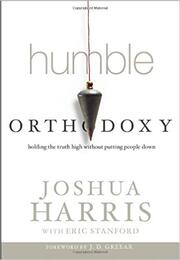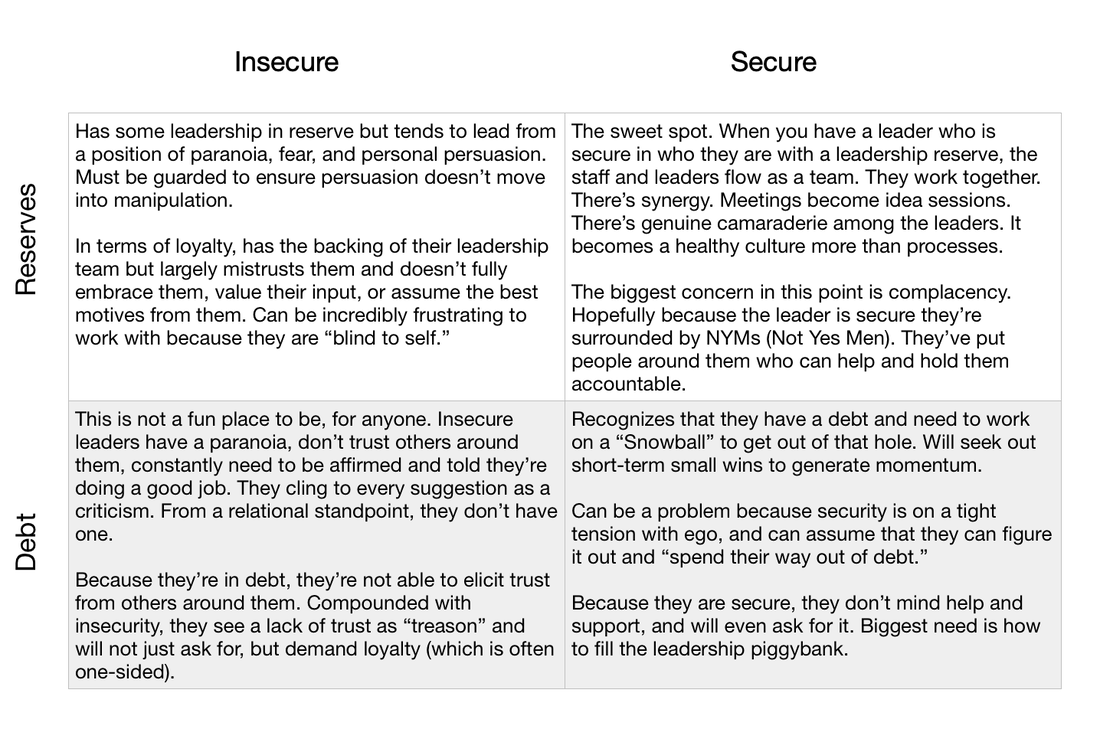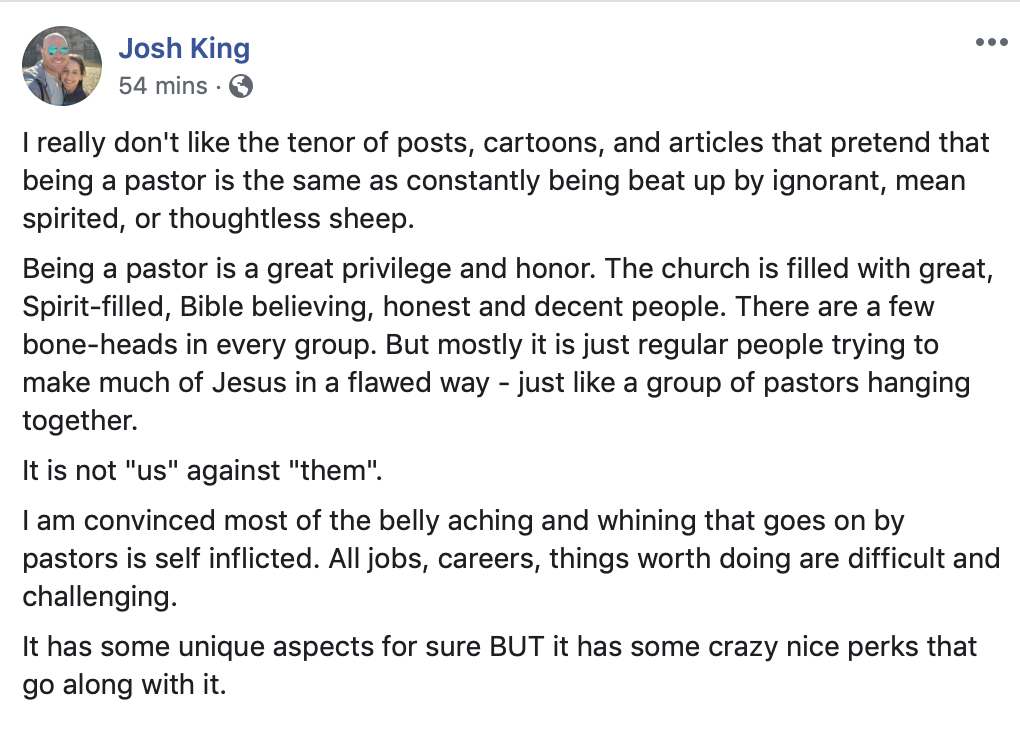|
The other day I was walking in the grocery store and passed by a spill. Like one of those "cleanup on Aisle 2" spills. It was everywhere. And I overheard the staff talking about needing extra cones to keep people from walking through the spill. The reason? "If you don't put them up, they'll just walk right through it." That night, I made sure to fold the ironing board before vacuuming the floor. I didn't want the ironing board blocking where I was trying to clean.
Barriers have a positive and negative effect in ministry. Barriers have a positive effect in that they keep us on track and moving forward. But they have a negative effect when they stifle growth or ministry function. I want to give a couple advantages of barriers and a few problems (and solutions) for barriers. Barriers help us determine priorities in resources, budget, staffing, and purpose - No church, no matter the size, can do everything. No car, no matter how well made it is, can drive through a construction site or jump an overpass (no matter how many times you saw the movie Speed). Barriers help us think about what's most important to us as a ministry, and to plan accordingly. If we know we can't go somewhere, it helps us identify and prioritize where we can go. Barriers keep us grounded in our convictions - Hopefully your church has some form of a confessional statement or statement of belief. Those form barriers to keep your church in line with your conviction of the teaching of Scripture. We might have some disagreement on the particulars, but we can all agree that we should act in accordance with our stated beliefs. Those become a standard for membership, for leadership, and for guiding the church through doctrinal issues. But they also keep us grounded in the practice of our convictions. Those barriers determine the lines you have drawn: whether they be your schedule to ensure you're keeping your family as a priority, or your opinion on who and where you'll counsel, or how you determine access to your facility. Healthy barriers can lead to healthy practices. Barriers can stymie growth - I have a love/hate relationship with tables. I like having one because I have a coffee cup attached to my hand most of the day, especially on Sundays. But I loathe tables because they limit how many people can be in a group. When we have physical limits, we're limited in what we can do. So we have to decide what we'll do with those limits. If you're limited in seating in a classroom, you can do one of two things: 1) You can multiply the group by forming a new one and allowing them both to grow, or 2) You can yank the tables. Same thing with worship seating. If you come up to the limit of your capacity, you can: 1) Build a new building, or 2) Go multiple services. However you decide to move, you need to take those barriers out of the equation. Barriers can be clutter - Clutter in a church sends a message of carelessness. It tells visitors and members that we don't really care about our facility, so we don't care that there is clutter. Barriers form when you're not allowed to take "that picture" off the wall or remove the parlor and turn it into an open fellowship area. When we clutter our space, we limit the movement of people. And when we clutter, we let people know we're not really that interested in company. Remember your mom getting a call that Aunt Sally was coming over? You cleaned the house. You expected company. So take that copier that's sat in the corner for years and throw it out. Take the dusty prints off the wall and replace them with something more ascetically pleasing. Barriers limit possibilities - When we put up barriers and don't take them down, we're limiting our possibilities. For some churches, it's a facility barrier (you build an area that has a single purpose). For others it's a staffing model (you've always had Minister of X). Still others it's a style or approach or methodology. Whatever your barrier is, it's limiting your possibility. As long as you think you still need the Minister of X, you'll never think about what could happen if you combined X with Y. Or that there is only one correct way to organize your worship service. If you don't believe that's an issue for churches, change things around and see how that goes! Instead of working with your barriers in place, adopt a mindset that it's not just ok to try but it's ok to fail. Not everything will work. But we shouldn't let that stop us from trying! What other things would you say about barriers? Their good? Their bad? How can you fix them?
1 Comment
 One of the best visuals for leadership in the local church is a piggybank. Like a piggybank, leadership make deposits in small amounts (unless the grandparents come visit). Deposits are made when we visit someone in the hospital, show up and faithfully preach each Sunday, visit during a crisis, counsel in difficult times, come to the funeral, and more. You know when you've made a deposit in your piggybank. Yesterday our children's ministry showed what they had been working on for weeks in memorizing a long chunk of Scripture. After the service I told our children's minister he had just made a nice deposit! The piggybank is our leadership trust that people have in us. It's the resource we have to lead people and our churches & ministries forward. It takes a long time to build, and it can get spent quickly. Leaders always have an initial deposit that comes during the honeymoon period. But over time, our deposits need to far exceed our withdrawals. Withdrawals happen when you make a decision or a move that requires people to trust you. They will if you have a good reserve. They might even if you don't and extend a line of credit. But just like a credit card, you're on the hook for far more than you realize when you lead in debt. But our piggybank extends beyond that to the people around us we directly work with and lead. If you're a youth pastor, this is your leadership team. If you're in music, this is your choir & musicians. For lead pastors, it's your staff & other key leaders. We have to make deposits not just in the general sense, but in a real specific sense with each of our leaders around us. Which brings us to the issue of "loyalty" in a leadership circle. There is nothing more awkward in a leadership circle than being asked for loyalty. It feels like a Mafia scene, minus the cannoli. Loyalty and Security go together, along with the idea of the piggybank. To help understand it, look at the "Ministry Loyalty Piggybank" matrix: Can I give 5 suggestions on how to improve here?
1. Get out of your office - For a lot of us, our office can feel like a sanctuary. It's filled with books, we can listen to our Spotify playlist, and it can be a place where we "get work done." But if we're not careful, our office can become a prison. We feel like we can never leave because "someone might need me." If we can get out of our office we can make investments in our leaders and our ministries by visiting homes, hospitals, and making connections in our community. Thanks to the wonders of modern technology, if we have a cell phone and a laptop we can "get work done" almost anywhere. 2. Read more - Yes, I know I just said to get away from your introversion. But leaders are readers. And if you want to be a better leader, read more. Read leadership books, read biographies, read doctrinally (and devotionally), read outside your wheelhouse. You'll pick up nuggets all around and it will help you be a better conversationalist if you've read broadly. 3. Get over yourself - A lot of insecure leaders focus way too much on themselves. Get over it. You're not that important. The Barna Group has a whole emphasis on healthy transitions because when it comes down to it, we're all interims. Someone else will take our place. Things will move on without us. You're not indispensable. You're a vessel for King Jesus to do work. That means He doesn't need you to do it. We're invited into His work to join Him, but the security a leader in ministry has doesn't come from their talent or from their calling, but from their source. For more, read Ephesians 1. 4. Listen well - Leaders aren't just readers, they're listeners. Listening well means shutting your mouth. It means seeking to understand where someone is coming from. A lot of leaders with a debt in their piggybank listen to respond. If you want to make deposits, actually listen to the people around you. Ask questions. Get to know them beyond their formal or functional role. Find out what makes them tick. Get their sense in how they see things, even when it's not how you see them. *Pro Tip - Everyone has a favorite Sonic or Starbucks drink 5. Seek out deposits and plan your spending - There's a reason the candy near the checkout is called the "Impulse Rack," the goal is to get you to buy something without thinking about it. As leaders, we have to be careful in how we plan our spending. Jesus talked about this when he said no one builds without first "counting the cost." For us, that means we make sure we've been prudent, prayerful, listened well to others, and sought buy-in from other leaders before making a "purchase" with our piggybank. Deposits are things we should seek out. The widow on the back row who is always alone? Go seek her out. The visiting couple who always come in late? Give them a call and do lunch. The faithful Sunday school teacher who shows up week after week, year after year? Recognize them in a service.  Much has been written about the recent news from Josh Harris. And I'm not going to go into it all here. It's something that we discussed on the Life & Ministry Podcast. For most, Harris' legacy is his since-repudiated book I Kissed Dating Goodbye (be honest, if you were a 90s youth group kid, you read it). But for me, his legacy and what has always stuck with me wasn't IKDG, it was another idea: Humble Orthodoxy. After the news broke, I bought and read Harris' primer on pursuing a humble orthodoxy. It was refreshing to my soul. I'd come across that term from another of Harris' books, Dug Down Deep, and it was a total reorienting of how to handle truth. At the core of the approach to humble orthodoxy is a dilemma: we don't have a truth problem, we have a heart problem. It starts with Paul's last words to his protege Timothy: So flee youthful passions and pursue righteousness, faith, love, and peace, along with those who call on the Lord from a pure heart.Have nothing to do with foolish, ignorant controversies; you know that they breed quarrels. And the Lord's servant must not be quarrelsome but kind to everyone, able to teach, patiently enduring evil, correcting his opponents with gentleness. 2 Timothy 2:22-25 After all the reminders to guard the faith, protect the deposit, and entrust it to "faithful men," Paul gives Timothy a last admonition: don't be a jerk.
Harris contrasts two wrong perspectives: 1) Arrogant orthodoxy, and 2) Humble heterodoxy. In one, truth becomes a hammer to drive nails into heretic hearts. It becomes a tool of exclusion, and in most cases becomes focused on secondary, rather than primary issues. In two, truth is removed from the discussion in the name of not offending. Both are wrong, because both miss out on a central tenet of theology: Truth has eternal consequences. While reading through Humble Orthodoxy, I couldn't help but think of times I'd not been humble. I'd been a jerk when humility was required. I put down trenches where God called for a table. I'd been impatient and careless as someone was processing books like The Shack or writers like Rob Bell - using orthodoxy as a hammer instead of showing "convictional kindness" and in doing so opening up confirmation bias for someone genuinely seeking wisdom. And now as a pastor, I want more than anything to be gracious in handling truth. I've been on the other side. I've seen the other side. And it doesn't drive to godliness, it drives despair. It's not to say truth is irrelevant or doesn't matter. It does. It matters for eternity. Truth is the difference (literally) between Heaven and Hell. Truth was what Paul's treatises were rooted in, was the basis for God's self-revelation, and is what guards our minds today. Truth is important. Contending for truth is important. Loving our neighbor means being honest with them about things that matter. But in our pursuit of humble orthodoxy, may I pose a few questions for us to consider? 1) Which is more important, proving a point or winning a person? Sometimes in our zeal for truth, we become like the Pharisees in Jesus' time. We focus so much on "being right" that we bomb bridges with our neighbors, family, coworkers, or even people in our church. Again, truth has eternal consequences. But as JD Greear has asked, do we love being right more than we love our neighbor? 2) What's offensive, the Gospel or me? The Gospel will divide. It tells people they're broken and need not just repair but death to self and life in Jesus. It tells people they are sinners but can find rescue in someone who they've never met who died for them. Jesus knew the Gospel would offend, His message got Him killed. But sometimes we miss the offense of the Gospel and we become the offensive one. We think it's because of Jesus, but really it's because we're jerks. 3) What has become to object of our affection, Right Theology or Jesus? I think it's totally possible for someone to love theology more than Jesus. They can love being right, being "orthodox," and being a walking systematic theology book.... but be completely dead on the inside. In a pursuit of humble orthodoxy, Jesus is the object of our devotion and love. From that flows orthodoxy. From that flows Truth, because what we know about Jesus and about God's redemptive plan is revealed to us in Scripture. 4) Is our orthodoxy matched by orthopathy and orthopraxy? In other words, is our devotion to doctrine met with a similar level of devotion to love and to action? Are our hearts and hands aligned with our heads? If our pursuit of Truth and Orthodoxy doesn't drive us to a greater Love (of God and of Neighbor - remember the Greatest Commandment?) and Action (serving God & Neighbor), then what good is our Orthodoxy? 5) Is our worship passionate or dry? Truth and Worship go hand in hand like love & marriage. Love drives a marriage, and marriage drives love. A humble orthodoxy still finds wonder and amazement in the presence of God. It still finds childlike joy in approaching the Throne. It doesn't parse every song for theological error (don't judge, we've all done it before) or argue over whether or not God's love can be "reckless." Humble orthodoxy can do this because it doesn't think it's all figured out. Worship stems from wonder. Humble orthodoxy sings What can wash away my sin? Nothing but the blood of Jesus, and doesn't immediately go to a theology of substitutionary atonement. It begins with wonder that Jesus would shed His blood for me. And in concert with that it begins a robust understanding of propitiation.
Seriously though, ministry leaders, we have to stop airing our grievances like every Monday is Festivus. Ministry, especially pastoring, is for grown ups. There's a biblical command for maturity to be entrusted with leadership in the church, and part of the expectations for pastoral leadership is that they'll be well thought of by those outside the church. That last one is where I believe we can find a direct principle link to how we post and how we talk about our jobs.
I love how Josh calls pastoring a "great privilege and honor." It truly is. It's incredibly humbling to be able to week after week stand and preach. It's even more humbling to be invited into people's lives during their worst (and best) moments. It's an honor when people share about how you have impacted their lives. Those are memories over the years I've treasured, and in many cases kept the cards. When we complain about our job or about the work/task of ministry, we're doing dishonor to the high calling we've been given. God called you to be a conduit of His ministry and work among His people. It's incredible that God would use any of us to accomplish His work. And work it is. It's hard work. It's time consuming. Sermons don't appear out of thin air. Meetings don't plan themselves. Administration doesn't just fall into place. And developing other people doesn't happen in a microwave. You'll work hard. At least you should. But it's good work because it's the exercise of God's gifting and calling in your life. It can also build contempt among the church. Can you imagine being in a church where the ministry leaders think everyone is out to get them (and post about it), or who complain about how their ministry obligations keep them super busy? Those church members who hear that are working 40-50 hours a week, balancing family obligations, and on top of that committing to attend and serve in the church. (chances are they don't get Fridays off) On a more pragmatic level, when we complain about the church, not just publicly but privately, we're breeding contempt among the people whose generosity and sacrificial giving enable our livelihood. Lazy pastors foster a complaining culture. When I was a teenager I worked for my dad off and on in a warehouse. During the summer it'd be 130 on the top floor and I'd leave every day drenched. The complainers were usually the ones putting in the least work. Same principle applies in ministry: busy pastors don't have time to complain. I love how Paul admonishes us in Ephesians 5:16 to make the best use of our time. We don't have long. And we can spend that producing fruit in our ministry, or complaining that we got apples instead of oranges. Here's what has helped me be more grateful as a pastor: taking 15 minutes every Monday to write 2 thank you notes to someone in our church who helped make Sunday better. Postcards are cheap to send. And it helps me be more grateful for the incredible privilege and honor it is to be a pastor. |
Scott M. DouglasA blog about leadership and the lasting legacy of family ministry. Archives
August 2023
Categories
All
|


 RSS Feed
RSS Feed



